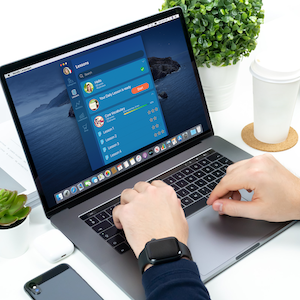|  Thanks to John Towner, today we visit Montmartre in Paris at dusk. | | | Bonjour! Get ready to laugh and learn with our fascinating French words of the week: énorme, signe, compétence, qualité, and autre, plus a hilarious joke about a duck on ice! Before we start:Join Mondly's 110 million users learning French on iPhone, Android, and on their computers. Check out Mondly's free trial or lifetime plan here!  |
| |
| |
|
|
énorme The French word 'énorme' is used similarly to the English word 'huge'. It can be used to describe something that is very big in size, amount, or degree. It is commonly used in both written and spoken language. Examples may include 'enorme maison' (huge house) or 'énorme quantité' (huge amount). Here's how to use it: | |
|
signe The word 'signe' in French translation is 'sign' in English. It can be used in several contexts such as expressing a symbol, a signal, or an indication in the French language. For instance, a traffic sign is 'un signe de circulation' in French. As with most languages, the connotation of 'signe' may change depending on the context. Here's how to use it: La tour Eiffel est un signe important de Paris. Il fait un signe de paix. Le feu rouge est un signe d'arrêt.
| |
|
compétence The word 'compétence' in French translates to 'skill' in English. It's used much like its English counterpart, referring to the ability to do something well. It might refer to a learned ability, such as 'computer skills', or a natural talent, like 'drawing skills'. Similarly, it can also refer to a proficient capacity in a job or profession, such as 'chef's skills'. Here's how to use it: La compétence linguistique est importante pour une communication efficace. La compétence en leadership est essentielle pour gérer une équipe. Le cours vise à renforcer la compétence en lecture des étudiants.
| |
|
qualité The French word for 'quality' is 'qualité'. It is used in a similar way to the English word, meaning the standard of something as measured against other things of a similar kind or the degree of excellence of something. It often used to describe products, services, experiences, or even personal traits, similarly to how it is used in English. Here's how to use it: Il est préférable de choisir la qualité plutôt que la quantité. Nous devons améliorer la qualité de notre service. Le professionnalisme est une qualité importante.
| |
|
autre The French word for 'other' is 'autre'. It is used to refer to an alternate or remaining person or thing in French. 'Autre' can also often used in contexts to imply 'different'. For example, 'l'autre jour' means 'the other day', and 'une autre personne' means 'another person'. The use of 'autre' also changes according to the gender and number; 'autre' for singular and 'autres' for plural. Here's how to use it: | |
|
😆😆😆 Couic-Couic le canard: C'est l'histoire d'un canard sur une patinoire et Couic-Couic le canard. | |
|
| You received this email because you signed up at LangBites.co. Click here to unsubscribe. |
| |
|
|
|

